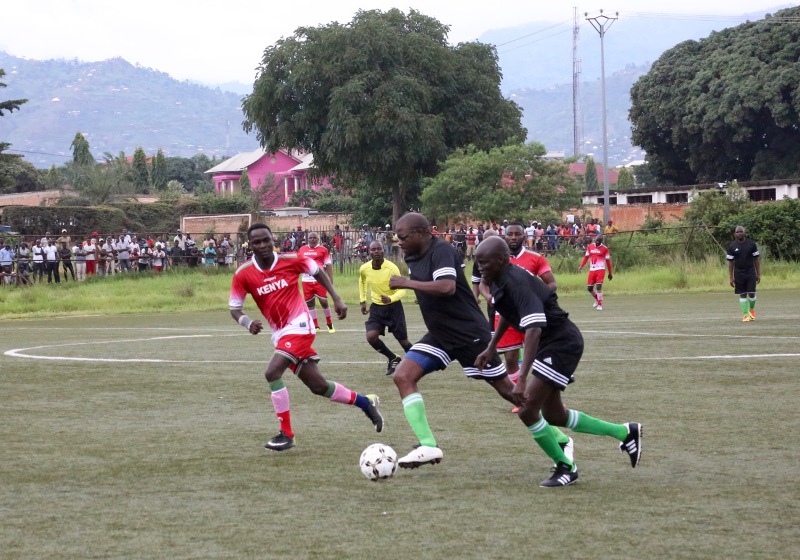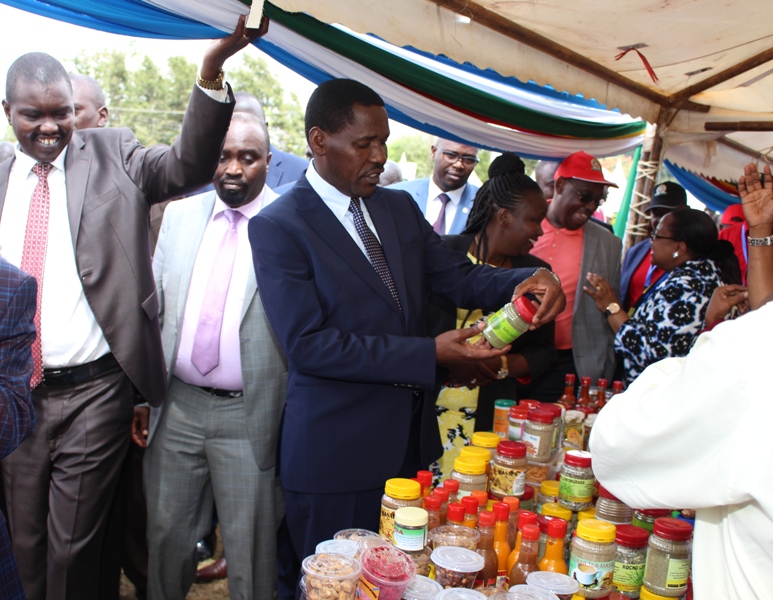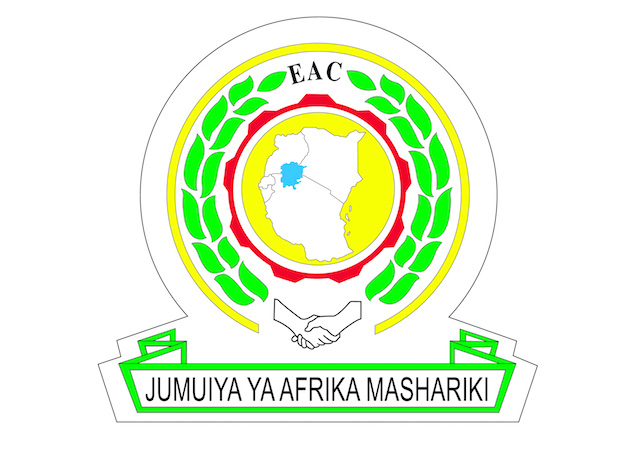
Posted in Press Release
East African Legislative Assembly, Bujumbura, Burundi, 6th December, 2018: The East African Legislative Assembly posted mixed results as the Games entered Day 5 in Bujumbura yesterday.
In football, EALA got off to a good start by defeating Parliament of Kenya 2-1 in an entertaining match at the Centre Technique, Ngagara in Bujumbura. Ahmed Mwapambe and Wycliff Ketto scored the all-important goals for the victors while Senator Cleophas Malala reduced the deficit for the Parliament of Kenya.
Both teams started the game on a high note with end to end action. Striker, Senator Kipchumba Murkomen, could have given his team an early lead but failed to latch on to a pass by Hon David Gikaria. On the opposite side, star striker, Ibrahim Jamal upon receiving a pass from Hon Julius Maganda beat the defence but shot wide with the goalkeeper Rogers Okwiri beaten. The EALA striker was, however, carried off the pitch with a suspected collar bone injury after a collision with a Parliament of Kenya player.
Ahmed Mwapambe was later to beat Rogers Okwiri to give EALA the lead after tapping in the ball, moments after Kenya’s goalkeeper blocked a rasping shot by Hon Kim Gai. In the second half, EALA resumed forcefully with the striking force making constant raids on the Parliament of Kenya backline. It paid off when Wyclif Ketto beat the defense line to unleash a block-buster in to the roof of the net for the second goal.
In other games of the day, Parliament of Uganda (women) won Parliament of Kenya by 3 Sets to 0. The victors won the first two sets 25-13 before taking 25-17 win to seal the lead.
In the second women’s match of the day, Parliament of Kenya beat EALA 3 sets to 0 (25-10) (25-5) and (25-19).
In men’s volleyball, Parliament of Burundi beat EALA 3 sets to 0 scoring (25-16), (25-22) and (25-16). In netball, Parliament of Kenya won EALA 44-12 in a one-sided match.
More games are expected on December 6 as Burundi and Uganda play in the first netball match before Parliament of Kenya lock horns with Parliament of Tanzania in the second match.
Later in the afternoon, the Parliament of Uganda will face off with Parliament of Burundi in football inn the first match, before EALA takes the field to battle out with Parliament of Tanzania.
- ENDS -
For more information, please contact:
Bobi Odiko
Senior Public Relations Officer
East African Legislative Assembly
Arusha, Tanzania
Tel: +255-27-2508240
Fax: +255-27-2503103
Cell: +255-787-870945, +254-733-718036
Email: BOdiko [at] eachq.org
Web: www.eala.org
About the East African Legislative Assembly:
The East African Legislative Assembly is the Legislative Organ of the East African Community. Its Membership consists of a total of 62, of whom 54 are elected Members (9 from each Partner State) and eight ex-officio members (the Ministers responsible for EAC Affairs from the Partner States, the Secretary General of the Community and the Counsel to the Community).The East African Legislative Assembly has legislative functions as well as oversight of all East African Community matters. The enactment of legislation of the Community is put in effect by means of Bills passed by the Assembly and assented to by the Heads of State, and every Bill that has been duly passed and assented to become an Act of the Community and takes precedent over similar legislations in the Partner States. EALA has to date passed 79 pieces of legislation.

Posted in Press Release
East African Community Headquarters, Arusha, Tanzania, 5th December, 2018: Kenya’s Cabinet Secretary for Industrialization, Trade and Cooperatives, Hon. Peter Munya,on Tuesday, 4th December, 2018 graced the official opening ceremony of the 19th EAC Jua Kali/Nguvu Kazi Exhibition taking place at the Eldoret Sports Club in Uasin Gishu County, Kenya.
The 19th edition of the annual EAC Jua Kali/Nguvu Kazi Exhibition, which is being held under thethemeSupport Micro, Small and Medium Enterprises, Build East Africa,has attracted over 1,400 artisans from five EAC Partner States, namely Burundi, Uganda, United Tanzania, Rwanda and the host country Kenya.
Addressing government officials, EAC Ambassadors and High Commissioners accredited to Kenya, and artisans present, Hon. Munya said that the main objective of the EAC Jua Kali/NguvuKazi exhibition was to provide a platform for enhancing marketing linkages for Micro, Small and Medium Enterprise (MSME) sector products and services within the region so as to enable them access the existing regional market with a population of 150m people.
The Minister noted that this year’s theme, “Support Micro, Small and Medium Enterprises, Build East Africa” augurs well for the region’s policy of supporting MSMEs get market within and beyond EAC borders.
He reaffirmed the six Partner States’ commitment to the EAC regional integration initiatives, like the ongoing exhibition, adding that the key component for the integration agenda was doing business together and expanding the market of East Africa, as well as removing the barriers to trade.
The Cabinet Secretary disclosed that Partner States were addressing the challenges impacting the growth and development of MSMEs and industries in the EAC.
He said that, for instance, all Partner States were putting in place elaborate and clear supportive policy frameworks to, among other things, empower and create MSMEs Authorities or Ministries that will oversee the development and promotion of small enterprises.
He also said that some Partner States were now enabling the MSMEs access affordable capital from financial institutions and putting in place mechanism for accessing their (SMEs) products by customers.
“We have in place an elaborate training and capacity building programmes for the MSMEs,” disclosed the Cabinet Secretary.
Addressing the same forum, the EAC Director General, Customs and Trade, Mr. Kenneth Bagamuhunda, commended Uasin Gishu County for hosting the 19th edition of the annual exhibition.
Mr. Bagamuhunda who was representing the EAC Secretary General, Amb. Liberat Mfumukeko, said that hosting and providing a lot of support to this year’s Jua Kali/Nguvu Kazi Exhibition in Eldoret was a true demonstration and commitment by the Republic of Kenya to the EAC integration agenda.
The Director General disclosed that the EAC was putting more emphasis is being put on the development of the informal sector as they (MSMEs) are the engines of growth in East Africa.
“MSMEs are the incubators of industrial growth in our region,” said Mr. Bagamuhunda, adding that that capacity building was ongoing for MSMEs in South Sudan. He expressed hope that South Sudan will participate in the 20th edition of the annual exhibition.
He hailed the ever-increasing participation of women in the annual event and said the Secretariat had put in place an elaborate programme targeting women in business in the bloc.
The Director General commended the Partner States, Confederation of Informal sector Organization, Regional and National Steering Committees, and the EAC Secretariat staff for the successful organization of the event.
On his part, the Governor of Uasin Gishu County, Mr. Jackson Mandago, praised the EAC Heads of State for making it easier for East Africans to trade amongst themselves and move freely across the borders.
He urged Kenyans especially those in his county to take advantage of the free movement of goods and people to enhance the trade, tourism and interaction with other Partner States.
“Jua Kali/Nguzu Kazi” is about people to people integration, take advantage of the good infrastructure – roads, rails, etc – to travel and explore East Africa. The products of East Africa are good, let us increase trade among ourselves, we have sufficient markets for our products, there is no need of going outside EAC or Africa,” said Mr Mandago.
Also present at the opening ceremony were the Principal Secretary State Department of Trade, Dr. Chris Kiptoo and his East African Community counterpart, Dr. Susan Koech, the Director of Trade at the EAC Secretariat, Mr. Alhaji Rashid Kibowa, and members of the East African Confederation of Informal Sector Organization (CISO-EA).
NOTES FOR EDITORS:
To support the role of the Jua Kali/Nguvu Kazi sector in the growth of the regional economy, the EAC Secretariat in collaboration with the EAC Partner States and the Confederation of Informal Sector Organization East Africa (CISO-EA), has organized the annual exhibitions since 1999. The exhibitions act as strategic avenues for promoting the sector’s products, transfer of technologies, and promotion of the regional integration process.
-ENDS-
For more information, please contact:
Mr Owora Richard Othieno
Head, Corporate Communications and Public Affairs Department
EAC Secretariat
Arusha, Tanzania
Tel: +255 784 835021
Email: OOthieno [at] eachq.org
About the East African Community Secretariat:
The East African Community (EAC) is a regional intergovernmental organisation of five Partner States, comprising Burundi, Kenya, Rwanda, Tanzania and Uganda, with its headquarters in Arusha, Tanzania.
The EAC Secretariat is ISO 9001:2008 Certified


